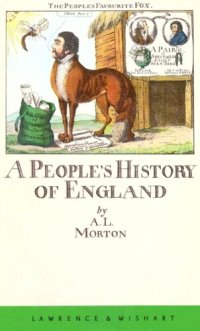
Ebook: A People's History of England
Author: A. L. Morton
- Year: 1976
- Publisher: Lawrence & Wishart
- Language: English
- pdf
A complete social and political history of England.
Excerpt from A People's History of England
Early maps show a world in which Britain is a remote outpost, a shapeless cluster of islands thrust out into the encircling ocean. But in some of these maps a significant tilt brings their South-western coast close to the North of Spain, reminding us that earlier still, centuries before the making of any maps that have survived, Britain lay not outside the world but on a regular and frequented trade route which linked Mediterranean civilisation with the amber-bearing North. It was by this long sea route and not across the Dover Straits or the Channel that civilisation first reached these shores.
In Cornwall, in Ireland and along the coast of Wales and Scotland cluster the monuments left by Iberian or Megalithic men who reached and peopled Britain between 3000 and 2000 A final group of such monuments in Sutherland, the last point at which their ships touched land before pushing across the North Sea to Scandinavia, makes the route and its Objective abundantly clear. At this time the land subsidence which had begun a thousand or so years earlier was still going on, and the apparently shorter and safer route up Channel and along the European coast was closed, if not by a land bridge joining Britain to the continent, then by straits that were narrow, shifting, shoaling and swept by rapid tides. This is perhaps the first reason for the settlement of Iberian man in Britain.
Arthur Leslie Morton was born in Suffolk in 1903. After studying at Cambridge University he taught at Summerhill, the progressive school run by A. S. Neil. A. L. Morton joined the Communist Party and published his Marxist work People's History of England in 1938. Other books by Morton include Socialism in Britain (1963), The English Utopia (1969), World of the Ranters: Religious Radicalism in the English Revolution (1970), The British Labour Movement, 1770-1920 (1973), Freedom in Arms: Levellers' Writings (1976), The Life and Ideas of Robert Owen (1978) and a study of William Blake, entitled, The Everlasting Gospel (1982).
With complete table of contents